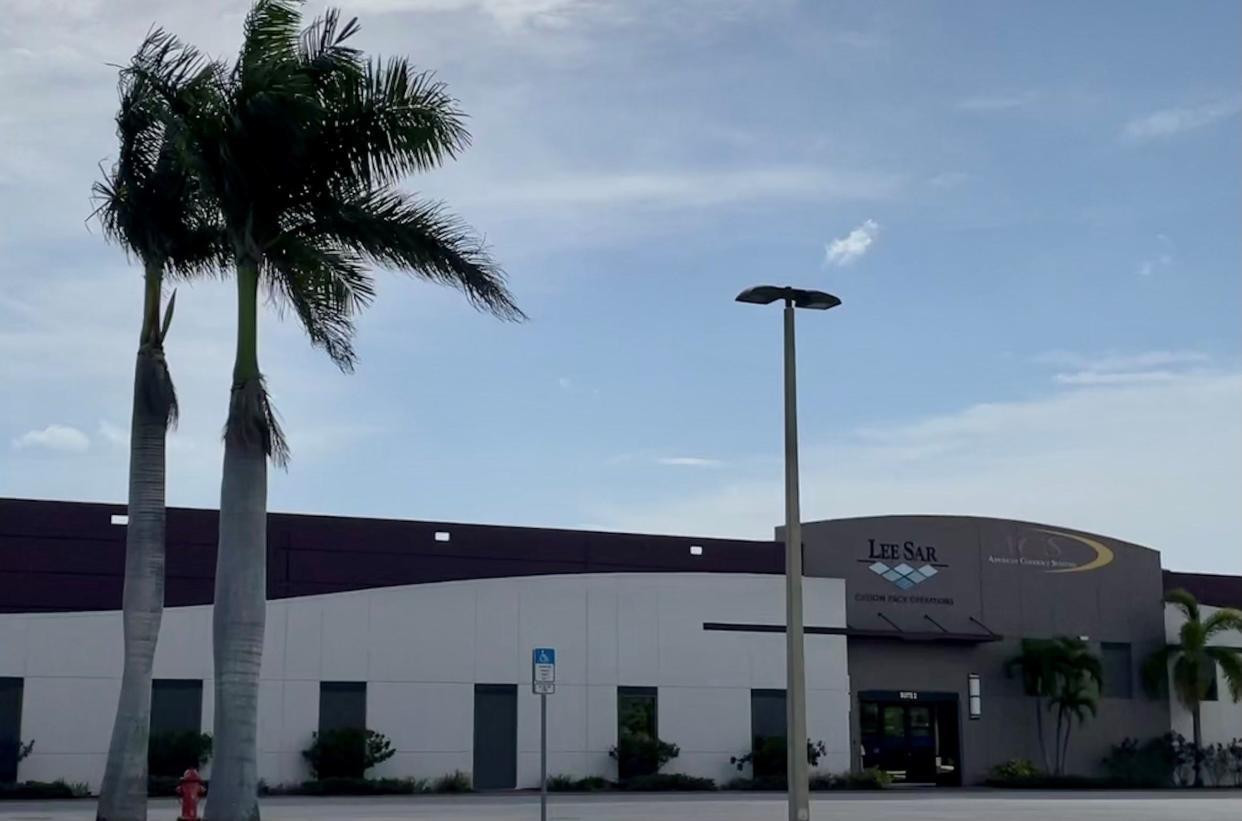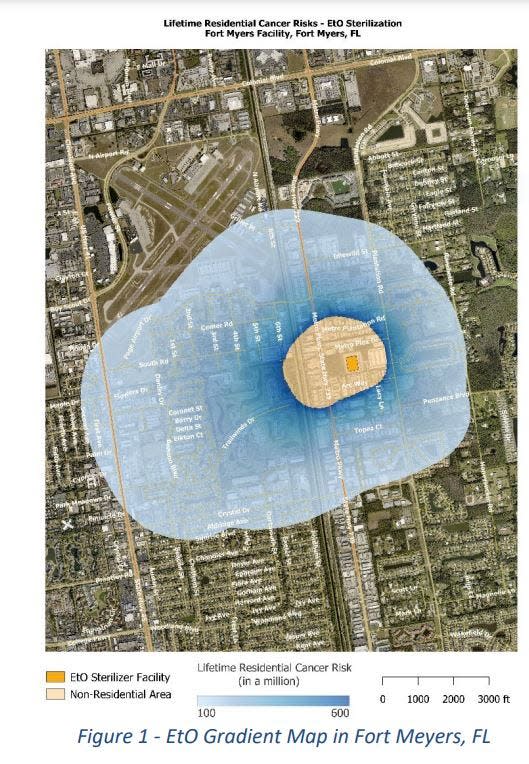Fort Myers plant released carcinogens for 12 years. How worried should neighbors be?

- Oops!Something went wrong.Please try again later.
More than a week after two online public meetings about cancer-causing pollution in Fort Myers, confusion remains.
On June 22, the U.S. Environmental Protection Agency held two online sessions notifying central Fort Myers residents, students and workers that a nearby plant was pumping risky levels of a cancer-causing chemical into the air. Many had learned about the meetings only days earlier.
Neighborhoods near the plant may have an elevated lifetime cancer risk, the agency said, which "gradually increases as you get closer." The study it cited assumed 70 years of near-constant exposure.
The agency apologized several times in each meeting. We’re concerned, officials said, and it's unfortunate we didn’t tell you sooner, but we got to it as fast as we could. And, by the way, the pollution coming from the LeeSar/American Contract Systems plant will all but end July 4, after new emission controls are installed.
'Community feels like it has been sucker-punched'
Alarm, outrage and questions followed.
Why did the agency wait years to tell people how dangerous it was?
Why were residents given less than a week to comment publicly on new rules for the substance – ethylene oxide, commonly called EtO – which is used, among other things, to sterilize medical equipment as it is in Fort Myers?
Why didn't the government prevent such pollution in the first place?
Fort Myers resident and healthcare worker Farah Zuberi’s comment to the agency was typical of many: “This plant has been in operation since 2011 and we are just now learning about it. The community feels like it has been sucker-punched … I still have many unanswered questions, but I do know that something needs to be done … I understand the need for sterilized medical devices, but it is equally important to not sicken the community in the process."

More: 'No safe level': Fort Myers plant pollutes air with a carcinogenic chemical, EPA warns
More: 'Beyond troubling': EPA faces outrage over Fort Myers plant's cancer-causing pollution
In a statement, the company said it uses strict safety measures and "takes every possible precaution, including regular external air monitoring and periodic internal air monitoring, to ensure the continued safety of our teammates and the community where we live and work ... More than a year ago we voluntarily initiated the installation of advanced air cleaning technology at our Fort Myers facility that will further reduce our already low EtO air emissions by over 99.9 percent ... ACS continues to work closely with state and local environmental officials and fully supports their efforts to protect our environment."
The Florida Department of Environmental Protection, which enforces pollution control measures, backed that up: The plant has never violated any rule and complies with all state regulations.
Trying to understand the safety/risk equation
Then why the EPA's concern?
Seeking clarity, The News-Press reached out to the agency: “There seems to be a disconnect between what we're hearing about risk from the ACS facility: namely that the risk is high, EPA is concerned, working quickly to do outreach here. (One EPA official) said this ACS facility uses a ton (2,000 pounds) of EtO a year and it all goes out the stack. Yet ACS emailed me a statement that said, in part, ‘ACS is fully compliant ... our proprietary process uses minimal amounts of ethylene oxide.’ Why the difference in messaging?"
The EPA responded that although ACS uses less of the chemical than many other facilities, “emissions from American Contract Systems are currently uncontrolled, meaning that facility has no active air pollution control systems in place. Our health risk modeling is based on actual emissions from the sterilizer facilities, taking into account the degree of air pollution control being employed.”
Responding to constituents' concerns, Naples Republican Congressman Byron Donalds met with EPA and Florida Department of Environmental Protection officials last week. Afterwards, he issued a release that said, in part: “Over the last several days, my office and I have worked diligently with the EPA, the Florida Department of Environmental Protection and other stakeholders to gather the most accurate and up-to-date information in assessing the detriment to the public.
“Following these productive conversations, the consensus is that there is no public hazard for citizens in the discharge zone. Additionally, the ACS plant is near completion of implementing a voluntary discharge control system to capture additional carcinogens, ultimately lowering EtO emissions by over 99.9 percent. Lastly, I, too, share the public’s frustration concerning the inadequate handling of the dissemination of information to the people that have caused undue panic and anxiety for countless families. As a result, I’ve sent a letter to the EPA calling for an extension of its official public comment period and an in-person meeting for community members to ask questions and submit their pertinent concerns.”
So far, no response, said senior Donalds advisor Harrison Fields, who says the whole process has been frustrating.
“People in the district are fired up. They’re worried about their kids,” Fields said. “If I was a father and I had kids at these schools, I would be just as concerned. People want to know what is their risk.” In the meeting, he pressed the point and eventually got an answer, he says. “No one actually wanted to say it, but that was the general consensus on the call: The risk was low.”
But he says Donalds’ office will continue to pursue answers. “We’re still on a fact-finding mission,” he said. “Something we’re also working on is coordinating with the CDC to bring tests to Southwest Florida for parents who want to check their kids’ blood out.”
At a Wednesday town hall for his constituents, the congressman fielded many questions from worried parents whose children attend some of the three nearby schools: Evangelical Christian, Villas Elementary and Fort Myers Montessori. Asked by parents whether he'd send his own kids to a nearby school, given what's now known about ethylene oxide emissions, his answer was an emphatic yes.
Donalds is concerned about public health, Fields says, but has sharp criticism for the way the EPA handled this. “They are basically creating hysteria,” he said. “I think most Americans would agree that tamping down potentially cancer-causing chemicals in the air is a good thing (but) how much of a concern is this?” he asks. “We just want to be sure the EPA isn’t just running amok with all these five-alarm fire notices when there could be actual solutions that don’t include 2,000 families in the area fearing for their lives.
"If you’re unable to stand by what you did with facts and evidence and cohesive decisions, then that’s a red flag.”
This article originally appeared on Fort Myers News-Press: How risky were 12 years of carcinogen emissions? EPA answer unclear

